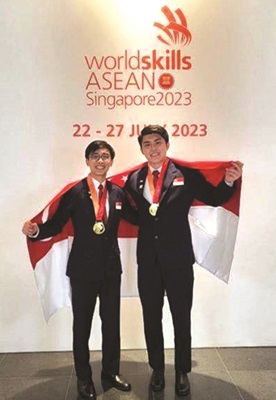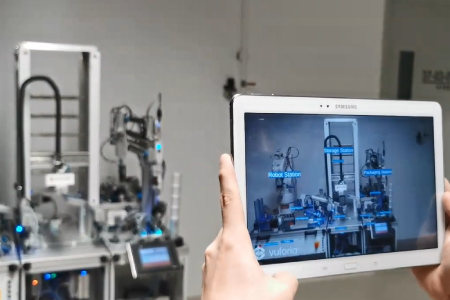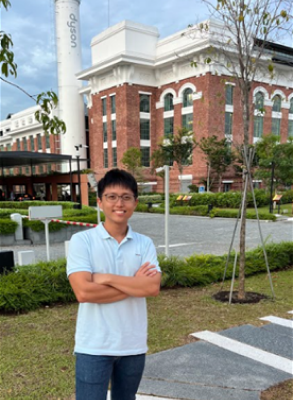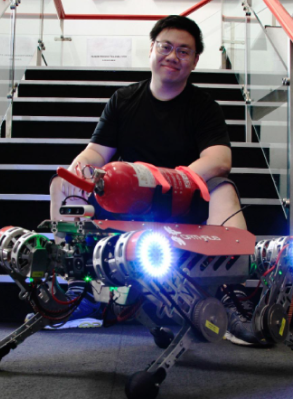Why MR?
- A broad-based curriculum with a strong focus on autonomous mobile and collaborative robotics
- Acquire skills in emerging technologies such as Augmented Reality, Robot Operating System, Computer Vision and Industrial IoT for exciting career opportunities in robotics engineering and automation!
- Choose to specialise in either Autonomous Systems or Automation & Industrial Cybersecurity
- Be among the first to earn a Second Major in Business, and unlock new opportunities for your career and further studies
About MR
Robots are changing our daily lives – imagine stepping out of your smart home, taking a self-driving vehicle to your favourite restaurant, and getting served by a robot waiter! The field of robotics and automation is steadily growing and finding its way into every home, company and industry. If you want to engineer the next generation of robots and smart machines, the Diploma in Mechatronics & Robotics (MR) is your ideal choice.With our broad-based curriculum, you will learn to use emerging technologies in robotics and automation, such as augmented reality, computer vision and Industrial Internet of Things, to develop high-tech solutions for consumer products and industrial applications. This will give you an edge when you pursue exciting careers in growing fields such as service robotics, autonomous driving technologies and industrial automation and applications.
In your final year, you can choose to specialise in one of two areas:
- Autonomous Systems
Gain expertise in autonomous mobile robot development, collaborative robot (cobot) programming, and autonomous vehicle deployment. This specialisation equips you with the skills needed for a career as a robotics engineer. - Automation & Industrial Cybersecurity
Get a head start in programming mechatronics systems using industrial controllers, while also learning how to secure industrial control systems by applying cybersecurity strategies and solutions.
Be among the first poly students to graduate with a Second Major in Business. Gain an edge with this dual qualification, which will unlock new opportunities for your career and further studies.
With many modules co-developed, co-delivered and
co-assessed with our industry partners such as Omron
Electronics, Universal Robots, HOPE Technik and
MooVita, you can be sure that you will be prepared
for the industry when you graduate. To give you an
edge in your career, there are also opportunities to go
on a six-month internship at companies such as PSA
Singapore, Bosch Rexroth, LKH Precicon, A*STAR and
Omron Electronics.
Alternatively, you can opt for the Industry Immersion
Pathway and embark on a one-year internship or
one-year project to deepen your expertise.
Plus, gain hands-on experience at high-tech mobility
solutions provider MooVita, situated right on campus!
Overview of Your MR Journey
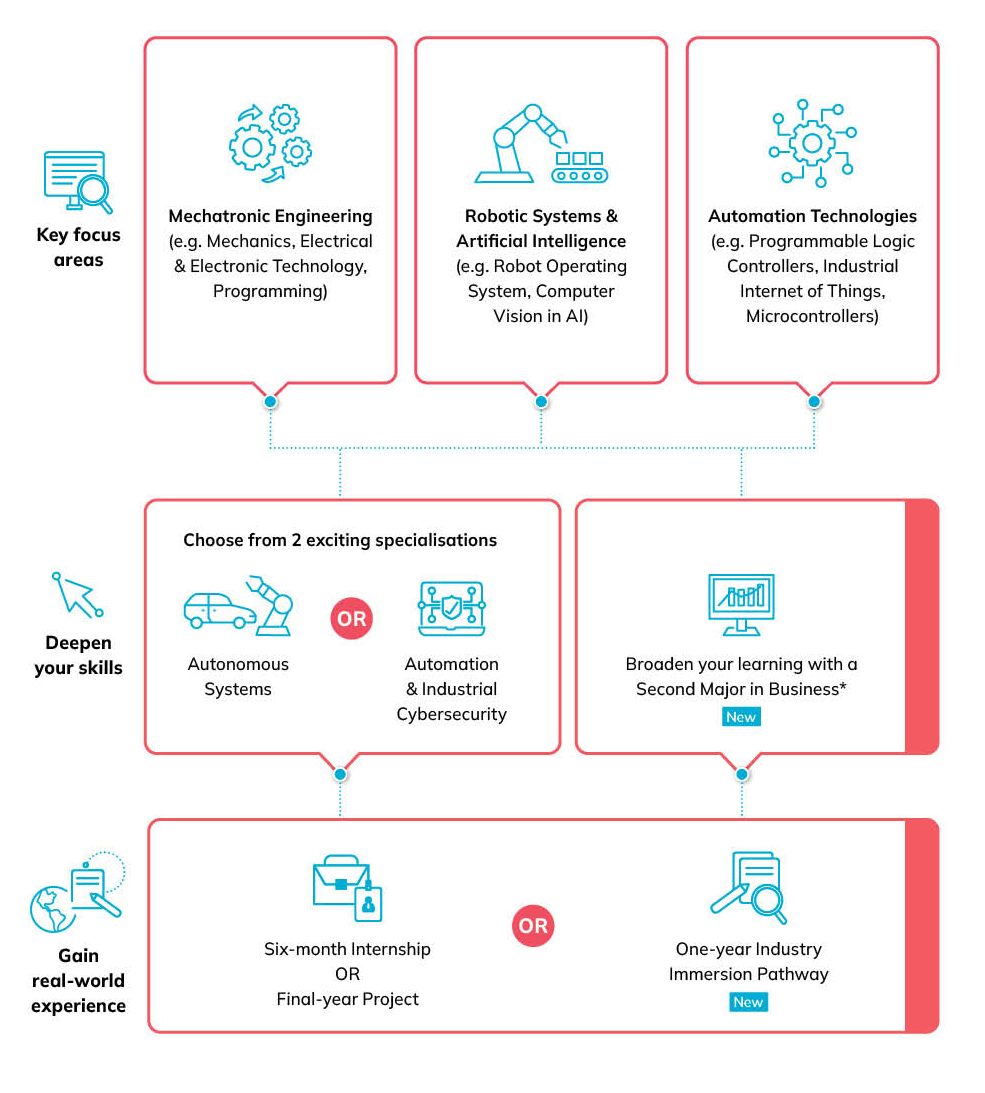
Highlights
Further Studies
You will be well prepared for further studies in mechanical, electrical or electronic engineering at both local and overseas universities. You may even be granted advanced standing in related engineering courses at:
Singapore
- Nanyang Technological University
- National University of Singapore
- Singapore Institute of Technology-University of Glasgow
Australia
- Monash University
- University of New South Wales
United Kingdom
- University of Manchester
- University of Sheffield
Careers
As a designer and engineer of automation systems, you will be well-sought after in jobs that involve the design, development and manufacturing of intelligent products and systems. You can look forward to pursuing careers in the following
job roles:
- Robotics Engineer
- Automation Engineer
- Application Engineer
- WSH Coordinator
- Assistant Engineer/Associate Engineer in Process Engineering
- Equipment Engineering
- Facility Engineering
- Quality Engineering
- Product Engineering
- Production Engineering
- Quality Assurance
- Quality Control
Entry Requirements
AGGREGATE TYPE ELR2B2-C
To be eligible for consideration, candidates must have the following GCE ‘O’ Level examination (or equivalent) results.
| Subject | 'O' Level Grade |
|---|---|
| English Language | 1-7 |
| Additional Mathematics/Mathematics | 1-6 |
| Any one of the following subjects: Biology Biotechnology Chemistry Computing/Computer Studies Design & Technology Electronics/Fundamentals of Electronics Physics Science (Chemistry, Biology) Science (Physics, Biology) Science (Physics, Chemistry) | 1-6 |
Applicants must also fulfil the aggregate computation requirements for the ELR2B2-C Aggregate Type ( English Language, 2 relevant subjects and 2 other best subjects) listed at www.np.edu.sg/docs/ELR2B2.pdf .
For students with other qualifications, please refer to the NP website for the entry requirements and admissions exercise period.
Candidates with colour vision deficiency, severe vision deficiency, profound hearing deficiency, uncontrolled epilepsy and/or severe physical impairments may encounter difficulties meeting the course requirements and expectations.
What You Will Learn
Mechanical Engineering Fundamentals
This module introduces students to the study of external forces in two dimensions and their effect on particles and rigid bodies that are at rest and at simple linear motion. Students
learn the knowledge and skills to analyze the forces acting on the bodies by drawing free-body diagrams and applying the conditions of equilibrium. This module also aims to equip students with the skills to analyze problems of rigid bodies in two dimensions
linear motion. Topics include forces and resultants, moments and couples, equilibrium, plane friction, kinematics and kinetics of linear motion.
Electrical Engineering Fundamentals
This module provides a foundation in electricity
covering basic concepts of electrical circuits and the methods used to analyse them. The module emphasises the understanding of the basic electrical circuit laws (Ohm’s Law, Kirchhoff’s Voltage and Current Laws) and network theorems, and their
application to electrical network analysis. Topics covered include fundamentals of electricity, network theorems, capacitance, electromagnetic induction and inductance, AC waveform and transformer fundamentals.
Engineering Mathematics 1
This module is designed to provide students with the fundamental skills in mathematics required to solve basic engineering problems. Topics are introduced in an order that is intended to keep abreast of the application requirements in engineering
modules. The emphasis in each topic is on simple applications and problem solving. Topics include algebra, trigonometry, logarithms, plane analytic geometry, matrices and complex numbers. Throughout the module, there is appropriate use of a Computer Algebra
System.
Programming
This practice-oriented module equips students with basic knowledge and skills in computer programming using a suitable high-level language. The main topics include basic computer programming concepts and
fundamental programming constructs such as sequences, selection and repetition.
Career & Engineering Professional Preparation
This module aims to give students a head-start in their professional careers
as they transit into a polytechnic engineering education. The module will equip students with knowledge and skills that can help them chart, navigate and advance in their individual education and career pathways. Students will be guided in adopting a
design thinking approach towards making their education and career plans. They will be exposed to career-centric self-assessment tools and online resources. As part of our efforts to help students benefit from the ubiquity of a professional online presence,
students will also establish their online professional brand by showcasing their marketable knowledge, skills and competencies.
To kickstart our students personal and professional development, the module will also impart various
knowledge and skills, such as, cultural intelligence, financial literacy, digital literacy, industry networking and safety. The topic on safety will be taught according to the Competency Unit “Develop a Risk Management Implementation Plan”
from the Singapore Workforce Skills Qualifications (WSQ) National Competency Standard. To augment this qualification, students will participate in industry engagements and service projects to glean the importance of safety in the engineering profession
and societal context.
Innovation Made Possible^
This module aims to help students discover and hone their innate ability to think creatively and come up with innovations to tackle problems close to their hearts. Underpinned
by the Design Thinking framework, students will be sensitised to the process of user-centric problem solving. They will be introduced to concepts such as empathy, problem-definition, ideation, prototyping and testing through a practical approach featuring
engaging out-of-classroom activities, just-in-time master-classes and a hands-on, “learning by doing” delivery format. Ultimately, the module will help students recognise that innovation is attainable and fun and develop creative confidence
to explore new ideas in their studies and beyond.
^Critical Core modules account for 13 credit units of the diploma curriculum. They include modules in communication, innovation
and world issues, as well as an interdisciplinary project. By bringing students from diverse diplomas together, the interdisciplinary
project fosters collaboration to explore and propose solutions for real-world problems. NP aims to develop students to be agile
and self-directed learners, ready for the future workplace.
Engineering Mathematics 2
This module is designed to provide students with the fundamental skills in mathematics required to solve basic engineering problems. Topics are introduced in an order that is intended to keep abreast
of the application requirements in engineering modules. The emphasis in each topic is on simple applications and problem solving. Topics include remainder and factor theorems, trigonometry, differentiation and simple integration with applications.
Electrical & Electronics Technology
The aim of this module is to introduce the fundamental concepts of digital electronic devices and circuits. It intends to deepen the electrical fundamentals learnt in the first semester. Topics
include AC circuit theory and transformer fundamentals, number systems, Boolean algebra, combinational logic design, applications of latches, flip-flops, counters and registers.
Engineering Drawing Fundamentals
This module aims to enable
students to understand basic engineering drawing concepts, definitions and the purpose of conveying all the information necessary for manufacturing a product or a part. Students will also work in teams and undertake the projects/case studies underpinned
by the design thinking and computer-aided design (2D skills) approach. Upon completion of the module, students will be able to apply the skills and develop confidence in tackling projects at higher levels.
Materials & Manufacturing Technology
This module introduces students to the fundamental of engineering materials and manufacturing process.
Materials lab practice including tensile test, hardness test, and machining technology including turning, milling, laser cut,
3D printing, sheet metal, assembly will be conducted during lesson hour. Students will be learning most of the content in the laboratory or workshop. Individual student will have to work on a designed workpiece in each workshop and get familiarised with
all manufacturing technology. In the lab practice lesson, individual student will have to do reflection and data analyse and practice on various kinds of materials testing and fabrication method. Safety and positive work attitudes are inculcated in the
student during training sessions.
Thermofluids
Thermofluid will provide students with a fundamental understanding of the 2 broad studies of fluid mechanics and thermodynamics. Students will learn the basic laws governing the behaviour
of fluids under the influence of various energy transfer.
Topics include systems concept, temperature and pressure, fluid statics, fluid in motion, continuity equation, laminar and turbulent flows, ideal incompressible flow, Bernoulli’s
equation, the first law of thermodynamics, properties of perfect gas and non-flow process with perfect gas. Students will also go through a simple case study of turbomachinary: pumps. By applying the thermofluid concepts, solve, understand and perform
basic sizing for pumps.
Confident Communication: Find Your Voice (VOICE)^
This module is designed to empower students to become thoughtful and confident communicators, while discovering their personal voice in self-expression.
It equips students with the skills to communicate with impact in a variety of settings, by tailoring their message to suit audience, purpose and context. Students will learn how to utilize storytelling structures and techniques, persuasive strategies
and effective visuals to connect meaningfully with their audience. The module also features a personalized growth plan that enables students to customize their learning experience according to their individual needs and aspirations. Peer learning and
coaching circles provide students the platform to practise their critical reasoning and presentation skills in a safe environment. Ultimately, the module encourages students to reflect on their communication habits and develop practical strategies to
enhance their effectiveness as communicators.
Health & Wellness^
This module provides students with an opportunity to be active, keep fit and stay healthy through basic sports skill acquisition. It also aims to enhance
student’s social and psychological well-being through a variety of sports electives while taking them through the process of character development, choice and decision making.
^Critical Core modules account for 13 credit units of the diploma curriculum. They include modules in communication, innovation
and world issues, as well as an interdisciplinary project. By bringing students from diverse diplomas together, the interdisciplinary
project fosters collaboration to explore and propose solutions for real-world problems. NP aims to develop students to be agile
and self-directed learners, ready for the future workplace.
Applied Mechanics
This is a follow-on module from Mechanical Engineering Fundamentals. It will equip students with the necessary skills to analyse problems of rigid bodies at rest and in motion. Topics include trusses,
friction, work energy method, power and efficiency and impulse momentum method. This knowledge plays an important role in many diverse engineering applications in the modern world, such as the design of cars, structures, airplanes, and various types of
machines. Students will be guided to solve engineering problems using these mechanics principles.
Computer Vision in Artificial Intelligence
This module aims to introduce students to artificial intelligence (AI) and the applications
of AI in industries to solve real-world problems in automation and robotics settings. Students will also learn the fundamentals of computer vision to perform image processing, video analysis, and perform object detection and recognition. Deep Learning
techniques will be introduced with potential applications in robotics and autonomous vehicles. The student will learn to design Graphical User Interface (GUI) using HTML, JavaScript, and Web Development Framework and deploy the web application in Cloud
Servers.
Industrial Automation
This module aims to equip students with the basic knowledge of automation technologies and their applications in the manufacturing and process industries. With the rise of new digital industrial
technology, known as Industry 4.0, students will also be introduced to smart sensors and actuators using IO-Link technology. This technology enables communication within the system (host controller) down to the sensor level.
Major topics include
electro-pneumatics technology, programmable logic control and IO-Link technology. The essential hardware components used in automated systems, such as sensors, valves and actuators will be applied to the automated systems. Widely accepted industrial control
programming language ladder and inline structured text will be covered, in conjunction with the learning of programming logic controllers and computer interfaces.
Laboratory work involves hands-on circuit construction and implementation
using these various technologies and techniques, which enhances students’ understanding of the practical aspects of circuit designs.
Microcontroller & System
In this module, students will be introduced to the fundamentals
of microcontroller, programming and interfacing. Through hands-on, students will learn to write programs in C language to control peripherals attach to the controller with interfacing the microcontroller to input-output devices such as switches, sensors,
LEDs, 7-segment displays, and motors.
Engineering & Sustainability
This module aims to develop in our students the knowledge, skills and disposition towards sustainability by introducing them to the dominant
environmental and climate change issues caused by technological developments. Students will learn about sustainability design in the context of engineering design considerations, such as, resource efficiency, environmentally friendly materials,
innovative sustainable products, lean and green operations, remanufacturing and responsible sourcing. In collaboration with community and industry partners, Service-Learning projects provide opportunities for the students to apply and hone their
Green skills while developing a deeper understanding of environmental sustainability issues and their social impacts both locally and globally.
The module also encourages students to appreciate and explore green job opportunities in engineering.
Career and Professional Preparation 2 is incorporated to equip students with the skills necessary to seek and secure such work opportunities. They will also be equipped to communicate their personal brand more effectively. As students sharpen their
communication skills, they will also learn how to market themselves effectively.
World Issues - A Singapore Perspective^
This module will expose students to a wide range of global issues discussed in the context
of Singapore as a nation state. Students will be guided to critically examine current affairs from various perspectives and develop an appreciation of the dynamism behind current world problems and consider possible solutions. The intent of this module
is to develop thinking students with well-considered perspectives who are able to articulate reasonable opinions, make thoughtful decisions and informed choices as active citizens in society. They will also be exposed to a multidisciplinary approach in
the mitigation of global challenges and thus be adequately prepared to handle Year 3 IS interdisciplinary Project ID.
^Critical Core modules account for 13 credit units of the diploma curriculum. They include modules in communication, innovation
and world issues, as well as an interdisciplinary project. By bringing students from diverse diplomas together, the interdisciplinary
project fosters collaboration to explore and propose solutions for real-world problems. NP aims to develop students to be agile
and self-directed learners, ready for the future workplace.
This module aims to equip students with the skills to select, and integrate machine elements (i.e. motors, gears, shafts, bearings, and springs) into mechanical devices and systems. Students will learn to use Computer-Aided-Design (CAD) software to model, design, and integrate mechanical systems for real-world application. Students will be introduced to Computer-Aided Manufacturing (CAM) for the manufacturing of components and products
Network Fundamentals
This module covers the introduction to the architecture, structure, functions, components, and models of the Internet and other computer networks. The principles and structure of IP addressing and the fundamentals of Ethernet concepts, media, and operations are introduced to provide a foundation knowledge and skills for network infrastructure. Upon completion of the module, students will be able to build simple LANs, perform basic configurations for routers and switches, and implement IP addressing schemes.
Robot Operating System
This module equips students with foundational knowledge and skills in developing functional applications using open-sourced Robot Operating System (ROS). Students will learn ROS software architecture and the different modes of nodes communication will be covered in the lessons. Students will apply the concepts learnt and perform automated navigations for mobile robotic systems in ROS simulated environment.
Strength of Materials
This module aims to provide students with the foundational knowledge of strength of materials with emphasis on applications and problem solving. It introduces to students the methods in the calculation of stresses and strains in various structural members such as beams, columns and shafts. Taking into account the material properties, students would then be able to apply the methods to predict the response of a structure under loading. Topics include simple stresses and strains, torsion in shaft, shear force and bending moment diagrams, stresses in beams, combined stresses and experimental stress analysis.
Mechatronic Drive Systems
This module covers the fundamental concepts and applications of motor drive systems. Topics covered include the types of industrial motors, motor control circuits and drive assemblies. In addition, this module also focuses on the practical aspect of selecting and sizing a motor based on the loading requirements. Students will also have the opportunity to explore the fundamental concepts of industrial hydraulic pumps, actuators and valves.
Systems Modelling & Control
The module focuses on modelling the dynamics and servo systems, analysis of system responses and shaping the dynamic response through closed-loop control. Students will learn the principles
of systems modelling, simulation, analysis and control, and the application of these principles in systems analysis and synthesis. Major topics include modelling single discipline and mixed systems, Laplace transform, s-plane, standard forms, time-domain
specifications, effects of control actions on system performance, and frequency response analysis.
Project ID: Connecting the Dots^
Project ID aims to prepare students for an increasingly globalised and interconnected
world where problems are multi-faceted and require interdisciplinary research and collaboration to solve. Using a project-based learning approach, students will have the opportunity to work in a multi-disciplinary team with students from across the polytechnic
to investigate and propose comprehensive recommendations for a pressing real-world problem affecting Singapore. they will be guided to step out of your disciplinary silos and effectively communicate and collaborate with peers from different backgrounds.
The module seeks to develop independent learning skills and the ability to synthesise diverse strands of knowledge to solve a complex problem, while impressing on them the importance of being a responsible global citizen.
SPECIALISATION
IN AUTONOMOUS SYSTEMS
(For 6-months Internship/ 6-months Final-year Project Pathway)
Autonomous Platform Systems
Autonomous vehicle and mobile robots are complex engineering systems, which demand skillsets
ranging from mechanical systems, electrical systems, software systems. This module provides hands-on experience to learner to acquire foundation know-how on developing an autonomous wheel-based robot for a real-world application. Learner will learn to
use sensors, drives and software technologies that are commonly used in autonomous vehicle and robot. Learner will also gain knowledge on autonomous vehicle operations and safety regulatory requirements and addressing sustainability in applications and
designs.
Autonomous System Deployment
This module aims to introduce the various functions and tasks that Autonomous Mobile Robot (AMR) or Autonomous Vehicle (AV) engineer may undertake to successfully prepare and deploy an AMR/AV
for operation. Topics includes sensor calibration and testing, map creation and cleaning, creating road network definition file, route planning and creation, obstacle detection and behavior testing.
Advanced Robotic Systems & Applications
This module introduces the integration and application of robot systems for automated processes. Fundamentals concepts in relationship to Industrial Robot Arms and Cobots, such as robot configurations, coordinate system and transformation matrix
is explored. Essential knowledge for robot implementations such as robot’s perceptions, motion control and path planning concepts are reinforced through simulations in the ROS (i.e. Robot Operating System) environment. Students will also verify
their robot implementations through practical sessions where simulation outcome are verified through actual physical robot system
SPECIALISATION IN AUTOMATION & INDUSTRIAL CYBERSECURITY
(For 6-months Internship/ 6-months Final-year
Project Pathway)
Advanced Automation System
This module aims to equip students with the knowledge of configuring, programming, maintaining, adjusting and controlling mechatronic systems with the use of programmable logic controllers
(PLCs) and Industrial Internet of Things (IIoT) gateway.
Major topics include programming and commissioning of mechatronic systems using the IEC61131-3 standard and integrating machines to the IIoT network using OPC-UA and MQTT for data
collection and control, which is part of Industry 4.0 Smart Factory.
Students will be taught theoretical knowledge and problem-solving techniques through lecturer-facilitated, hands-on activities and project work to ensure correct and safe
machine operation.
Operational Technology Security
With Industry 4.0, the modern Industrial Control System (ICS) are facing more advanced threats from the Internet outside as a result of the Informational Technology/ Operational
Technology (IT/OT) convergence. Protecting them through Operational Technology (OT) cyber defense is an evolving field required to continually adapt cybersecurity strategies so as to maintain the safety and reliability of production operation.
This module aims to equip students with the knowledge of design, maintenance and protection functions within the Operational Technology (OT) environment. Using a case study of a simulated environment with Industrial Internet of Things Capability
(IIoT) capability, the student perform activities with relevance to OT cybersecurity administration and maintenance in order to establish a secure OT environment. This includes performing asset discovery, managing vulnerabilities in existing OT systems,
as well as performing access control management across OT systems and devices
In addition, the module also introduces the concept of industrial networking and various cyber security standards, protocols and frameworks and are knowledgeable
in using various cybersecurity tools to perform their job accordingly.
Augmented Reality & Robotics Systems
This module aims to equip students with the emerging technologies for Industry 4.0 in the automation industry context.
This includes Augmented Reality (AR) and the use of robots in the industry.
Students will learn to create Augmented Reality (AR) applications with the objective of illustrating and training operators to do maintenance without the need of a
training manual. Students will learn various application of robots such as mobile robots and robot arms to control work pieces in the automation setting.
In the process of developing the application, students developed creative thinking
skills and cultivated an attitude of inquisitiveness in finding solutions to meet the user’s needs.
Year-Long Internship I
The Year-Long internship aims to enhance existing internships to enable a more structured
applied-learning pathway co-supervised by company supervisors and polytechnic lecturers. Learning resources such as learning guides and taskbooks would be purposefully designed to scaffold students’ learning throughout the year-long internship phase.
The learning guides and taskbooks would cover the essential knowledge and comprise an inventory of essential on-the-job tasks designed to cover all desired applied learning outcomes as part of the internship assessment. The contents of the learning guides
and taskbooks will be jointly developed with the industry. Students would submit a final report at the end of each semester and present what they have learned. Assessment would be conducted jointly by the school and company supervisors.
Final
Year Project I
This year-long project module is designed to provide students with practical, hands-on experience while developing skills and knowledge comparable to those gained through traditional structured modules. The module focuses
on a comprehensive, real-world engineering problem or innovation challenge, which students will work on from inception to completion in that semester.
Throughout the project, students will engage in research, design, analysis, prototyping,
testing, and reporting, mimicking the processes found in engineering disciplines. They will be required to apply theoretical knowledge from core subjects, solve complex problems. The project will encourage collaboration, critical thinking, and innovative
problem-solving, simulating industry practices and preparing students for professional engineering roles.
^Critical Core modules account for 13 credit units of the diploma curriculum. They include modules in communication, innovation
and world issues, as well as an interdisciplinary project. By bringing students from diverse diplomas together, the interdisciplinary
project fosters collaboration to explore and propose solutions for real-world problems. NP aims to develop students to be agile
and self-directed learners, ready for the future workplace.
The six-month internship will provide students with the opportunity to apply the knowledge acquired in the classroom to work situations, and demonstrate problem solving, communication and interpersonal skills in a work environment. The programme enables students to hone their ability to work independently and in teams, while they take on one or more practical projects under the supervision of industry practitioners. The objective is to develop a professional approach to work based on the relevant code of practice.
Final-year Project
In this module, students will work in teams to design and develop a product or system related to a real-world project. In the project, students learn to apply their knowledge and skills in creative problem solving, engineering and design, teamwork and project management. This module focuses on the identification of problem or need, research and design. Student are required to fabricate the prototype, assemble the parts, test and refine the prototype, and prepare the refined design and a project report. Students are also required to do a final presentation to a panel of examiners.
Year-Long Internship II
The Year-Long internship aims to enhance existing internships to enable a more structured applied-learning pathway co-supervised by company supervisors and polytechnic lecturers. Learning resources such as learning guides and taskbooks would be purposefully designed to scaffold students’ learning throughout the year-long internship phase. The learning guides and taskbooks would cover the essential knowledge and comprise an inventory of essential on-the-job tasks designed to cover all desired applied learning outcomes as part of the internship assessment. The contents of the learning guides and taskbooks will be jointly developed with the industry. Students would submit a final report at the end of each semester and present what they have learned. Assessment would be conducted jointly by the school and company supervisors.
Final Year Project II
This year-long project module is designed to provide students with practical, hands-on experience while developing skills and knowledge comparable to those gained through traditional structured modules. The module focuses on a comprehensive, real-world engineering problem or innovation challenge, which students will work on from inception to completion in that semester.
Throughout the project, students will engage in research, design, analysis, prototyping, testing, and reporting, mimicking the processes found in engineering disciplines. They will be required to apply theoretical knowledge from core subjects, solve complex problems. The project will encourage collaboration, critical thinking, and innovative problem-solving, simulating industry practices and preparing students for professional engineering roles.
Second Major in Business
This is a follow-on module from Mechanical Engineering Fundamentals. It will equip students with the necessary skills to analyse problems of rigid bodies at rest and in motion. Topics include trusses, friction, work energy method, power and efficiency and impulse momentum method. This knowledge plays an important role in many diverse engineering applications in the modern world, such as the design of cars, structures, airplanes, and various types of machines. Students will be guided to solve engineering problems using these mechanics principles.
Computer Vision in Artificial Intelligence
This module aims to introduce students to artificial intelligence (AI) and the applications of AI in industries to solve real-world problems in automation and robotics settings. Students will also learn the fundamentals of computer vision to perform image processing, video analysis, and perform object detection and recognition. Deep Learning techniques will be introduced with potential applications in robotics and autonomous vehicles. The student will learn to design Graphical User Interface (GUI) using HTML, JavaScript, and Web Development Framework and deploy the web application in Cloud Servers.
Industrial Automation
This module aims to equip students with the basic knowledge of automation technologies and their applications in the manufacturing and process industries. With the rise of new digital industrial technology, known as Industry 4.0, students will also be introduced to smart sensors and actuators using IO-Link technology. This technology enables communication within the system (host controller) down to the sensor level.
Major topics include electro-pneumatics technology, programmable logic control and IO-Link technology. The essential hardware components used in automated systems, such as sensors, valves and actuators will be applied to the automated systems. Widely accepted industrial control programming language ladder and inline structured text will be covered, in conjunction with the learning of programming logic controllers and computer interfaces.
Laboratory work involves hands-on circuit construction and implementation using these various technologies and techniques, which enhances students’ understanding of the practical aspects of circuit designs.
Microcontroller & System
In this module, students will be introduced to the fundamentals of microcontroller, programming and interfacing. Through hands-on, students will learn to write programs in C language to control peripherals attach to the controller with interfacing the microcontroller to input-output devices such as switches, sensors, LEDs, 7-segment displays, and motors.
Finance & Accounting for Business
The module imparts basic accounting and finance knowledge to students, in areas such as accounting equations, accounting principles, financial statements, ratio analysis, cash budgeting, short-term financing strategies, time value of money and capital investment analysis. Students will demonstrate their understanding by using financial software to interpret financial accounting information for decision-making in business environments when working on integrated project scenarios.
Economics
This module provides students with an understanding of the core principles of microeconomics and macroeconomics with an application of these concepts in real-world business scenarios. Topics include Demand and Supply, Price Elasticity, Market Structure, Gross Domestic Product, Unemployment, Inflation, Fiscal and Monetary policy.
This module aims to develop in our students the knowledge, skills and disposition towards sustainability by introducing them to the dominant environmental and climate change issues caused by technological developments. Students will learn about sustainability design in the context of engineering design considerations, such as, resource efficiency, environmentally friendly materials, innovative sustainable products, lean and green operations, remanufacturing and responsible sourcing. In collaboration with community and industry partners, Service-Learning projects provide opportunities for the students to apply and hone their Green skills while developing a deeper understanding of environmental sustainability issues and their social impacts both locally and globally.
The module also encourages students to appreciate and explore green job opportunities in engineering. Career and Professional Preparation 2 is incorporated to equip students with the skills necessary to seek and secure such work opportunities. They will also be equipped to communicate their personal brand more effectively. As students sharpen their communication skills, they will also learn how to market themselves effectively.
Computer Aided System Design
This module aims to equip students with the skills to select, and integrate machine elements (i.e. motors, gears, shafts, bearings, and springs) into mechanical devices and systems. Students will learn to use Computer-Aided-Design (CAD) software to model, design, and integrate mechanical systems for real-world application. Students will be introduced to Computer-Aided Manufacturing (CAM) for the manufacturing of components and products
Robot Operating System
This module equips students with foundational knowledge and skills in developing functional applications using open-sourced Robot Operating System (ROS). Students will learn ROS software architecture and the different modes of nodes communication will be covered in the lessons. Students will apply the concepts learnt and perform automated navigations for mobile robotic systems in ROS simulated environment.
Strength of Materials
This module aims to provide students with the foundational knowledge of strength of materials with emphasis on applications and problem solving. It introduces to students the methods in the calculation of stresses and strains in various structural members such as beams, columns and shafts. Taking into account the material properties, students would then be able to apply the methods to predict the response of a structure under loading. Topics include simple stresses and strains, torsion in shaft, shear force and bending moment diagrams, stresses in beams, combined stresses and experimental stress analysis.
Financial Markets & Instruments
This module examines the structure and functions of a modern financial system. Students will learn about the key roles played by the financial markets and institutions, and how the major types of investment instruments, such as stocks and bonds, are being utilised to facilitate the flow of funds. Emphasis is also placed on current issues in the financial sector such as Environmental, Social and Governance (ESG).
Global Business
This module provides students with fundamental knowledge of how the external business environment, consisting of country and industry level factors, affects the overall strategy, organisational structure and various internal functions of international businesses. Students will also discuss how contemporary world affairs, such as the impact of globalisation, terrorism, pandemics, emergence of economic powers in Asia and digitalisation present both opportunities and challenges to international businesses.
This module provides students with an understanding of the basic knowledge of the law and its application in a business environment. Topics include the Singapore Legal System, Law of Contract, Law of Tort, Law of Agency/E-Commerce/Artificial Intelligence Law (E-Comm/AI Law), Law of Business Organisations, Introduction to Company Law and Intellectual Property Law. Students will also develop clarity of thought that requires a critical discerning eye and logical reasoning when applying legal principles to practical business decisions.
Corporate Finance
This module aims to equip students with the fundamentals of Corporate Finance. Students will acquire knowledge on the workings of a firm such as capital budgeting, equity financing and project valuation, which encompass the use of financial management principles and valuation techniques. Board matters; ESG and corporate actions taken by a firm will also be covered.
Develop a Business
This module is designed to let students learn how to create and validate business ideas, and subsequently start and grow a business/ venture. Students will learn how to apply the Blue Ocean Strategy to create value. Students will also learn to analyse and present their idea using the Business Model Canvas and carry out experiential activities based on their proposed business ideas.
People & Culture
This module empowers students to design inclusive cultures through the interdisciplinary blending of organisational psychology and human capital management principles. Students will adopt an applied approach through collaborative experiential opportunities with industry to enhance existing human capital practices, allowing positive employee experiences and well-being to thrive.
Marketing in the Digital Age
This module covers the fundamentals of marketing in the digital age. It allows students to explore how a marketer can use new and emerging technologies to create strategies to build business relationships effectively. The module aims to provide a holistic view of the entire marketing programme to reach out to the consumer at every touchpoint of their customer journey, both online and offline.

